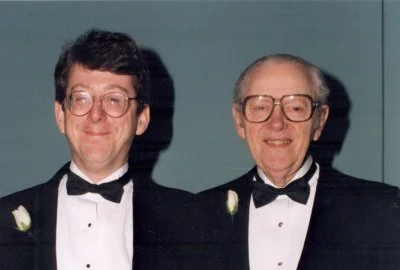Arthur Kahn, Moderate
Rabbis Marc Fitzerman (dweeb) and Arthur Kahn (dignified older man)
—
Until very recently, the rabbis of our synagogue shared a common point of origin. My successor, Daniel Kaiman, is our first Belarussian, with a New World detour into the islands of the Caribbean. Most of the rest of us, and that means six or seven, are rooted in the Jewish lands north of Poland. We come from places like Latvia and Lithuania, and it turns out that we lived in a close-together cluster. My mother’s family is from a town called Zaresai, known by Jews as Ezherene. It’s right on the northern border of Lithuania. Rabbi Kahn, my predecessor originated in Utian, as far from Zaresai as Tulsa is from Atoka. You got on the main road in one town or another and a couple of hours later, you arrived where you were headed.
The difference, of course, is that Rabbi Kahn actually lived there. He had crystalline memories of Jewish life in Lithuania, and we had long conversations about what he recalled. I remember what I expected to hear: a nostalgic review about pious rabbis and studious yeshiva boys, about the soft focus holiness of Shabbat in the shtot. It’s what Heschel reports in his monograph on the Sabbath, where he drenches Eastern Europe with the syrup of his memory.
Rabbi Kahn most certainly talked about all of this, but he drew a completely different picture. Utian turns out to have been a complicated place. There were pious people there, but also atheists and free thinkers. The town had a cadre of zealous Zionists, and Jews who had abandoned the traditions of Torah. He remembered a group that held a dance on Yom Kippur, probably Bundists, or Diaspora nationalists.
I was very much taken with this frank description, not only because it bumped out my sense of history, but for what it said about Arthur Kahn himself. He saw the reality of Jewish life in Lithuania and decided to do it justice without rounding the edges. He was frank and honest about the world he came from and spoke about its Jews—and here I mean all the Jews he remembered—with a kind of empathy and loving understanding. The Jews who danced on Yom Kippur were not Satan worshippers or unredeemed sinners, but Jews who simply had different ideas about the world.
I think that we are lucky that he brought that sensibility to Tulsa. You might have looked at Rabbi Kahn as a rabbinic traditionalist, and that would have been a fair assessment. He was learned in the languages of Jewish literature, and his practice was careful and fully coherent. He knew what to do and he was a fastidious Jew.
But he presided over a Synagogue that was changing radically in his time, from the personal observance of its once traditional members to the role of women and our encounter with modernity. To take the example on what happened in our sanctuary, he held his ground on the use of microphones, but he looked out at congregation which was not separated by gender.
There were once Orthodox rabbis who did the same, but they are now gone from the American Jewish scene. We would be a better, stronger Jewish community if their preference for moderation were still operating in the world.
